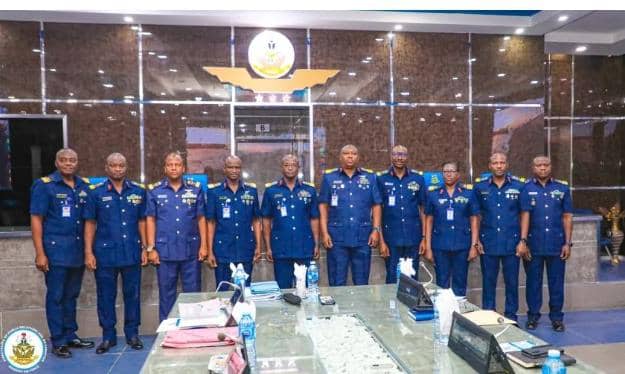NAF Inaugurates Civilian Harm Mitigation, Response Board
By ZAKAA LAZARUS.
The Nigerian Air Force (NAF) on Tuesday inaugurated a Civilian Harm Mitigation and Response (CHMR) Board to lead the implementation of its Civilian Harm Mitigation Action Plan (CHMR-AP), in a bold move to enhance the protection of civilians in conflict areas.
This was revealed in a statement made available to newsmen in Abuja by the Director of Public Relations and Information of the Service, Air Commodore Ehimen Ejodame.
The statement said the strategic initiative reflects the NAF’s growing commitment to upholding international humanitarian law and embedding accountability in air operations.
Speaking at the inaugural meeting of the Board, the Chief of the Air Staff (CAS), Air Marshal Hasan Bala Abubakar—represented by the Chief of Civil-Military Relations, Air Vice Marshal Ibikunle Daramola—reaffirmed the NAF’s unwavering commitment to protecting civilians during operations.
He noted that the NAF remains resolute in ensuring its missions are conducted with precision, accountability, and humanity.
According to him, “We will continue to adapt and refine our strategies to minimise harm and strengthen the legitimacy of our operations,” he stated, underscoring the importance of embedding civilian protection into the core of the NAF’s air power doctrine.
Air Marshal Abubakar emphasised that by institutionalising civilian harm mitigation, the NAF aims not only to reduce the risk of civilian casualties but also to foster greater public trust and operational transparency. He added that the CHMR Board is expected to serve as a cornerstone for ongoing reforms in the conduct of air operations, ensuring that the protection of civilians remains central to all mission planning and execution.
The statement added that the Board has been tasked with driving the execution of the CHMR-AP across the full spectrum of NAF’s organisational structure, including in joint operational environments.
According to the CAS, “Effective implementation requires prompt coordination across the entire NAF echelon. This Board will ensure that our commitment is translated into measurable action.”
It further explained that the key responsibilities of the Board include identifying, compiling, and assessing data on civilian harm incidents. This encompasses intelligence from NAF combat assessments, reports from partner nations, non-governmental organisations, civil society groups, and open-source materials.
Additionally, the NAF Civilian Harm Assessment and Investigation Cell is charged with conducting harm assessments, analysing patterns and trends, drawing lessons, and monitoring implementation progress.
“This is a critical institutional step,” Air Marshal Abubakar affirmed. “We must ensure that our air operations do not compromise the safety of the very people we are sworn to protect. Every innocent life matters.”
He noted that over the years, the NAF has consistently adapted its strategy to suit Nigeria’s evolving threat environment, employing air power with precision in various theatres across the country.
“The establishment of the CHMR Board is another layer in this transformation, reinforcing the NAF’s mission to balance operational effectiveness with ethical responsibility,” he concluded.













